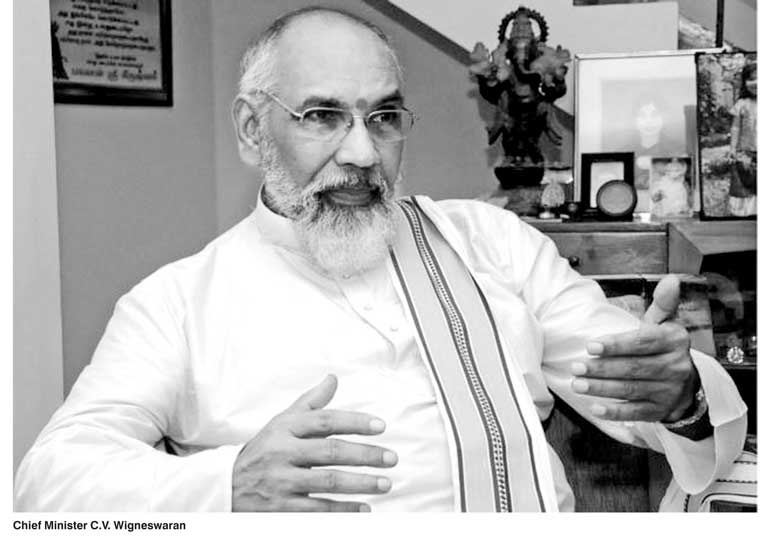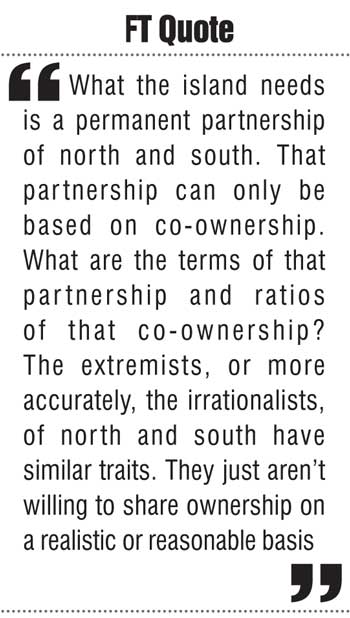Saturday Feb 21, 2026
Saturday Feb 21, 2026
Saturday, 28 October 2017 00:26 - - {{hitsCtrl.values.hits}}

Critique of Chief Minister Wigneswaran’s call for federalism
This is the reality today: Anything and everything within this Constitution, but nothing outside this Constitution. A two-thirds majority is possible for moderate constitutional change, reform; but a two-thirds majority is unlikely and improbable for a change of Constitution.
‘Constitutional reform’ is possible and desirable, defined and delimited as reform of the existing Constitution and within it, but Constitutional replacement—a new Constitution—is not. If there is no political dialogue, no political process, no Constitutional reform whatsoever, there could be a nonviolent revolt in the north. But if there is an unabated drive for Constitutional replacement (inevitably, unalterably, perceived as the retreat or retrenchment of the Sri Lankan State from the north) there could be a non-peaceful revolt in the south, which will wreck the economy.
The only answer, the only way out, is a Presidentially-driven, politically multilateral, broadly consensual, negotiated Constitutional rectification and renovation. Vasudeva Nanayakkara has suggested this in the media.
What is the heated debate about the Constitution really about? What is it bringing to the surface from deep within the collective psyches of the Sinhalese and Tamils and/or their respective political elites? It is the question of the Social Contract governing the island. In that the Social Contract on the island is about political power and power relations, the Constitution is more correctly understood as the Political Contract that mirrors and moulds the Political Order.
Having lost a bitterly fought, long war, by what logic do the Tamil nationalists believe that a new Constitution more reflective of their aspirations can be put in place? Not having won the war for the State, by what logic do the UNP leadership and ex-president Kumaratunga think that their effort to radically restructure the post-war political order will be seen as legitimate and acceptable?
If the Tigers and their Tamil support base had agreed to a negotiated settlement, a new Constitution could have been part of that transition, but they didn’t and the war ended in a clear defeat and a clear victory, therefore a new Constitution which effects a tectonic power shift to the Tamil majority provinces is outrageously absurd.
Having beaten the Tamil separatists but not the Indian neighbour in that war; having won the war with Indian support, and having lost the civil war over devolution in the late 1980s, by what logic do the Sinhala nationalists think that they can avoid paying the debt incurred for Indian support in that war, still less roll back or hold back the results of the 1987 Accord?
The Tamil nationalists think they can undo the results of 2009. The Sinhala nationalists think they can undo the results of 1987. They are both wrong. What went wrong for Mahinda Rajapaksa is that he was deadlocked by those who tried to undo or ignore 1987 (and the foreign bills of 2006-2009), on the strength of 2009. What is going wrong now is that the Yahapalana Government is being pushed by those who think that January 2015 can undo May 2009.
Permanent partnership of north and south
What the island needs is a permanent partnership of north and south. That partnership can only be based on co-ownership. What are the terms of that partnership and ratios of that co-ownership? The extremists, or more accurately, the irrationalists, of north and south have similar traits. They just aren’t willing to share ownership on a  realistic or reasonable basis.
realistic or reasonable basis.
The extremists among the southern majority are unwilling to share the ownership of this island with the Tamils and other minorities, though they are willing (except in the case of the rabid Islamophobes) to adopt a policy of benign (and sporadically malign) tolerance of their presence. The extremists among the northern minority want an equal share of state power and political space with the overwhelming majority and if not, they want their own separate political space. Thus we are intractably deadlocked.Chief Minister (and old Royalist) C.V. Wigneswaran gave an interesting interview the other day to a Colombo newspaper, in which he intelligently argued the case for federalism:
“In my reply to Dinesh, I said if Comrade Philip and his wife who owned their Mulgedera in Boralugoda, occupied the entire estate and if Dinesh and his brothers came of age and married and had children and Comrade Philip gave portions of the Mulgedera to his children to put up houses and live in their allotted portions of land, Comrade Philip will continue to occupy the Mulgedera but the children will put up new houses for themselves in their allotted areas. They will visit each other and have the best of relationships. But each son would be entitled to special rights over the plot allotted to him. ‘That is federalism,’ I said. Centre sharing its power with the periphery!”
A room of one’s own
OK, so let us accept the analogy and consider the country, this island, as a piece of property, an estate. The state is the common, shared home we build on that land. Since that land is a small island we cannot build two separate homes or allow them to be built. Nor can we allow a room at the end of the home abutting the neighbours, with free access to the unfriendly neighbour, a neighbour who is hostile to the inhabitants of the rest of the home; indeed to the majority of the householders.
The reasonable or realistic political right of the Tamils of Sri Lanka as a community is best exemplified in the title of Virginia Woolf’s book ‘A Room of One’s Own’. She was talking at the time, the early decades of the 20th century, about the irreducible space required by women writers, and more generally of women of creative talent—one might say of women in general. She advocated an income and a room with a lock and key.
The same argument is true of the Tamil minority of Sri Lanka. This being a small island, the case for a house of one’s own cannot be sustained. What is feasible here on this island, this ‘estate’ (to use Wigneswaran’s metaphor), is a common home with a comfortable room of one’s own. Of course there are those Sinhala extremists who would grudge the Tamils even this. “Why a separate room? Isn’t that separatism?” they say. Since you watch TV in our common living room and you dine at the main table, and can use any toilet, why do you need a room of your own? This attitude betrays an insensitivity that is incapable of recognising a distinct identity, the need for privacy and an irreducible space of one’s own. What is true at the individual and personal level is also true at the political and collective level.
The Tamil Question is one of adequate autonomous political space and power. Put plainly, a degree of collective freedom, not as individual citizens because they already enjoy that, but as a collective in the geographic area they think of as home. Some Tamils think that this political space is not achievable within a single country. Some think it is, but if it is not, they would seek it outside the present confines of the state. Some think it exists but it is inadequate because it is not equal to that of the Sinhalese.
What is sad is that few Tamils recognise that an autonomous or potentially autonomous political space already exists, and it does so within the country. There may be problems with that space, some legitimate dissatisfaction with it, but those problems can be negotiated. This existing space is the 13th Amendment and the system of Provincial Councils. What needs to be done is to accept and recognise that and proceed to negotiate renovations and modifications, without calling into question the architecture of the house as a whole or demanding another.
Some of the Tamils or even most may want a separate house, but that cannot even be the subject of discussion, whatever the abstract right of self-determination, because all concepts are subject in their actual working out, to the constraints imposed by geopolitical reality. This is true not only of self-determination, which has its limits on a small island, but also the right of national/state sovereignty, which has its limits for an island neighbouring a giant subcontinent which contains co-ethnics/ethnic kin of some of the inhabitants on the small island.
Several ironies
When one concedes the reality that the Tamils are a distinct people, one encounters several ironies. Each side uses the term distinct to its advantage. Sinhala supremacists use it to stereotype Tamils (one prominent spokesperson even wrote that they were “brainwashed from birth”) while the Tamil supremacists use it to make a claim of being not merely distinct but distinctive, special, and therefore deserving of special status. An argument actually goes that there is no point in the Tamils having the same provincial autonomy as the Sinhalese because theirs is a special situation. This overlooks the facts that ‘specific’ is not a synonym for ‘special’, and that the specific will be manifest in the policy agenda of that elected Council. It does not require a special status for the Council, above and beyond those in the rest of the island.
This is not to say that the Tamils do not have great achievements to their credit, but on this island they are not the ones with a claim to exceptionalism. The unique combination of the Sinhala language, Theravada Buddhism and an overwhelming majority make the case for Sinhala exceptionalism on this island. However, exceptionalism does not mean, should not mean, and must not be allowed to mean, domination.
Certainly there are valid claims for Tamil exceptionalism but since they, unlike the Sinhalese, have a “global ethnoscape” (to use Darini Rajasingham’s phrase)—not as recent immigrants but as compact communities with deep roots—those claims will have to be made elsewhere, probably in the neighborhood, rather than here. The last place on the planet that special political status beyond their demographic weight within its borders, will be accorded to the Tamils based on some claim of being a special or chosen people with a distinct destiny, is the small island of Sri Lanka. This is not the island on which to build a Tamil Zionist homeland.
The Sinhala extreme Right cannot abide the idea of a Tamil homeland (the ’87 Accord called it an “area of historical habitation”). But it is perfectly feasible for different peoples, distinct collectives, to regard some areas as civilisational and historical homelands within the common homeland of all of us, Sri Lanka, just as we regard some places as our respective hometowns within this, our country. The problems are either when a homeland is seen by the relevant community as outside the common Sri Lankan homeland (as was Tamil Eelam) or regard their homeland as exclusively theirs, i.e. as ethnically cleansed of other communities. Furthermore, a particular ethno-cultural homeland within a common national homeland cannot have the same political status and rights as the larger common homeland. The former is a sub-unit within the larger national unit or a sub-structure within the unitary state structure. And it is not a federal state unit. There cannot be mini-states within the Sri Lankan state, or, as President Premadasa insisted, there are no provincial governments; there is only one government. No ethnic homeland can decide whether or not the national armed forces should be stationed there and in what numbers or ratios.
This is all the more so when the ethnic homeland in question is a strategically sensitive border area, and/or when it has been an intense conflict zone, spawning suicide terrorism, for three decades up until less than a decade ago.
In a common home shared by an extended family, everyone or every nuclear family must have a room, but the allocation of rooms must be according to nuclear family size i.e. on the basis of need. Thus the political space i.e. the share of political power enjoyed by a minority community, will never be the same as that enjoyed by a majority community any more than a minority shareholder of a company will have an equal share of control over the decision-making and destiny of the company. There are exceptions, especially in authoritarian secular systems (Syria, Rwanda), but it tends to be the norm in ‘one person-one vote’ democracies. The Soulbury Commission tried to explain as much to the Tamil representatives.
Justice and fair-play
To return to the analogy of rooms in a common home, rooms may be of different sizes but in the interest of justice and fair-play, they must be equally comfortable, of the same quality and have the same furnishing and amenities. Thus the Provincial Councils of the north and east must have the same powers and functions enjoyed by the Provincial Councils of the rest of the country. Of course the occupants of the rooms will share the common spaces of the house, of the common home. Thus the Tamil people, will, as they do now, be represented at all levels thanks to universal suffrage and the proportional or mixed system of representation.
The Tamils will continue to punch their weight at the centre but cannot be expected to punch above it, unless they change their paradigm. For instance, nothing in the law or the Constitution prevents a Tamil or Muslim from being elected the leader of Sri Lanka, and one could imagine Lakshman Kadirgamar reaching such heights. However utopian it may seem, Kumar Gunaratnam is already seen among radicalised youth as a potential leader of the country.
This presupposes however, that the Tamil or Muslim personality concerned has succeeded in communicating successfully with the Sinhala people and transformed himself/herself into a truly national i.e. Sri Lankan leader, transcending the ethnic and religious divides.
This needs a paradigm shift and is the paradigm shift that is needed. It is hardly unfair. Had Barack Obama sounded like a member of the New Black Panthers or the Black Lives Matter movement (which I can empathise with), he could hardly have expected to be elected the President of the United States or even the candidate of the Democratic Party.

